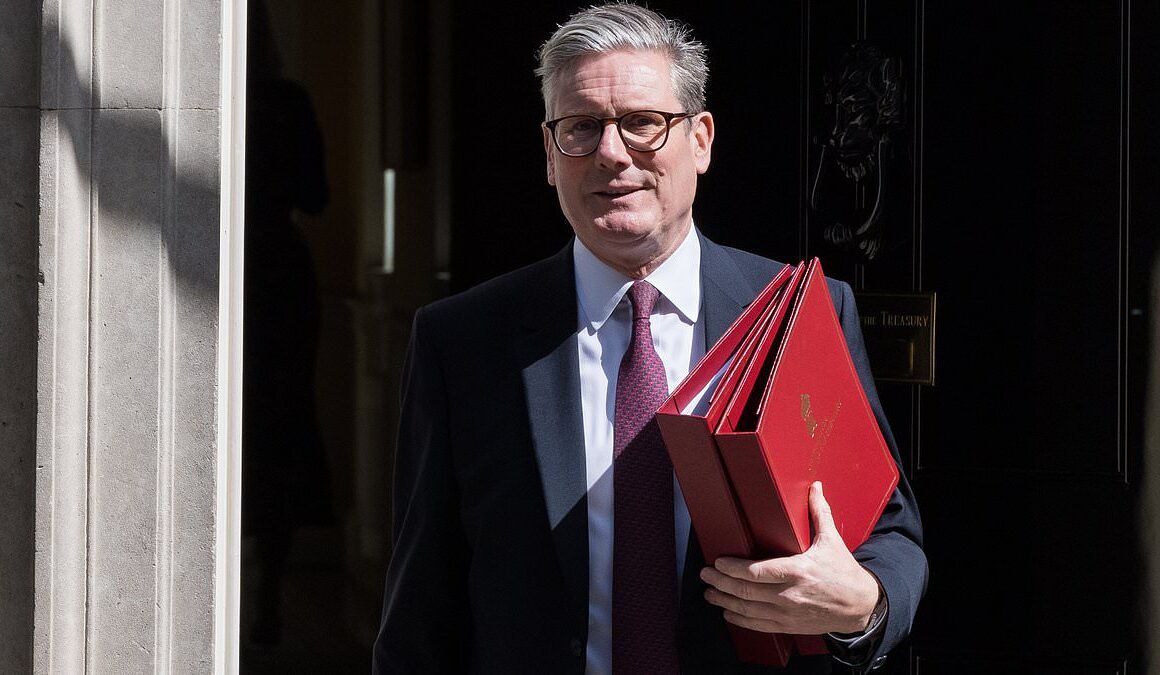That was quick. Only last week, I wrote in this space: ‘The Conservatives fought a running battle over public sector pay during the past two years: I doubt Labour has an appetite for the strikes that approach provoked and a confrontation with the unions which fund their party so generously. They will pay up.’
Lo, within a few hours of those words being published, Labour had not merely agreed to meet unconditionally and in full the pay review bodies’ recommendation of a 5.5 per increase across the public sector, they also offered 22 per cent over two years to junior doctors.
And the official press release on the deal openly referred to the strikes carried out by the doctors’ union (the British Medical Association) as ‘devastating’.
Well, they were certainly devastating to patients: 1.5 million operations and appointments had been cancelled as a result.

Labour ministers are living in La La Land when it comes to the economy, writes DOMINIC LAWSON
Harm
In fact, the main difference between this deal and the one from the outgoing government that was rejected was that the Conservatives had refused to back-date theirs to the beginning of the current financial year.
They felt it crossed a red line to apply the increase to a period in which the junior doctors were inflicting such harm.
Another difference is there was nothing in Labour’s statement to suggest it had made any demands of the BMA in terms of productivity improvements – a contrast to what happened when the last government settled its dispute with the consultants in April this year.
Then, the BMA agreed to stop promoting its controversial ‘rate card’ for overtime, which had pushed up shift costs to sometimes eye-watering levels.
Declining productivity in the public sector, especially the NHS, is perhaps the most critical challenge facing the Government.
According to a recent BBC analysis, compared to five years ago, spending on the NHS, over and above inflation, had risen by 20 per cent and its workforce had increased by almost a quarter, yet the number of patients starting basic treatments (such as hip replacements) has barely increased at all.
This was far from just a Covid effect: the figures showed that the NHS started to become less productive in the late 2010s. This might explain why the public are increasingly of the view that the NHS is wasteful and inefficient.

I think Wes Streeting, the new Health Secretary, understands why the public are increasingly of the view that he NHS is wasteful and inefficient

Secretary of State for Energy Security and Net Zero, Ed Miliband has said that ending new oil and gas development in the North Sea will improve our ‘energy security’ even though indigenous production is one of the UK’s most productive industries
I think the new Health Secretary, Wes Streeting, understands this as well as anyone. But some of his Cabinet colleagues are dwellers in La La Land.
And none more so than the Secretary of State for Energy Security and Net Zero, Ed Miliband – the man behind Labour’s preposterous pledge to ‘decarbonise’ the entire electricity supply of this country by 2030.
He has already said there will be no more new oil and gas development in the North Sea.
Aside from the odd idea that this will improve our ‘energy security‘, the fact is that indigenous oil and gas production is one of the UK’s most productive industries.
Otherwise, how could it have prospered, posting large dividends to shareholders (including British pension funds) while also paying uniquely high tax charges amounting to 75 per cent?
And another 50 per cent is paid by drivers in duty and tax at the pumps. Basically, taxes on astonishingly productive hydrocarbons have helped to keep the British welfare state afloat.
Fantasy
Labour claims its ‘world-leading’ rush to remove all fossil fuels from electricity supply will save consumers money.
When, in March, it released its portentously-titled document Make Britain A Clean Energy Superpower, it asserted that its policy would cut our home energy bills ‘by up to £1,400’ a year.
By the election, Labour had adjusted that to a promise that ‘total de-carbonisation of electricity supply’ would save the public an average of ‘£300 off their bills’ every year.
But in Parliament last week, ministers refused to repeat this fantasy figure when challenged (perhaps the civil servants have told them it can’t be justified).
This didn’t stop one Labour spokesperson, asked about Rachel Reeves’s decision to remove the winter fuel allowance (worth up to £300 a year) from millions of pensioners, responding glibly that its new Great British Energy company ‘will bring people’s energy bills down’. Not this winter it won’t.

When the wind doesn’t blow, which often tends to be during the coldest weather, we will need the highly flexible gas-fired power stations which the Government has committed to decommissioning (pictured: wind turbines off the coast of Aberdeen)

Labour’s Chief Secretary to the Treasury, Darren Jones, was embarrassingly recorded in June saying the real cost of reaching Net Zero would be ‘hundreds of billions’
And possibly never. For in the real world, when the wind doesn’t blow, which often tends to be during the coldest weather, we will need the highly flexible gas-fired power stations which the Government is sworn to decommission.
Not so, says Miliband: we could use ‘long-term energy storage’. Problem: even with the latest battery technology this costs, per megawatt-hour, three times more than it does to produce the original electricity.In other words, this whole scheme is fantastically unproductive.
That’s before considering the scale of the investment required. In June, the man now Labour’s Chief Secretary to the Treasury, Darren Jones, was embarrassingly recorded saying the real cost of reaching Net Zero (the ultimate objective) would be ‘hundreds of billions’.
Which only confirms what the head of Mitsubishi power, Javier Colada, said of Labour’s scheme: ‘Is everyone so wealthy and so happy to increase the cost of everything?’
More damning still is the verdict of Sir Dieter Helm, Britain’s leading energy economist.
He points out that while the marginal cost of wind is zero, ‘that’s not the system [capital] cost.
Shouldn’t we think about how this plays out as a liability for current consumers, but most likely future consumers too?
Because this is an enormous dash for debt.’So given Reeves’s determination to prove herself a prudent custodian of the national finances, what will be done to finance this dash for debt?
Scrapped
It seems most likely that capital gains tax will be ramped up in her first Budget. But that will be productive only in discouraging entrepreneurs, running directly counter to Keir Starmer’s claim that ‘wealth creation is Labour’s number one priority‘.
Labour is also threatening to enforce the so-called ‘sectoral collective bargaining’ beloved of its trade union paymasters – but, as a recent paper by the Policy Exchange think-tank demonstrated, this has long been known to restrict productivity growth.

It’s most likely that Rachel Reeves will ramp up capital gains tax in her first Budget
And last week, Labour unerringly targeted the technology at the heart of productivity growth, when – to help fund the public sector pay increases – it scrapped Rishi Sunak’s commitment of £800 million for an ultra-powerful computer at Edinburgh University and £500 million for the AI Research Resource programme.
The fundamental point is that it is not mere GDP growth that makes a nation more prosperous: if that is done less efficiently, there is a terrible price to pay later (as we found in the 1970s).
The truth was best expressed by the Nobel Prize-winning economist Paul Krugman (a man of the Left, as it happens): ‘Productivity isn’t everything, but in the long run, it is almost everything. A country’s ability to improve its standard of living over time depends almost entirely on its ability to raise its output per worker.’
Actually, the last Labour leader to win a general election, Tony Blair, understood this. Does Keir Starmer?








